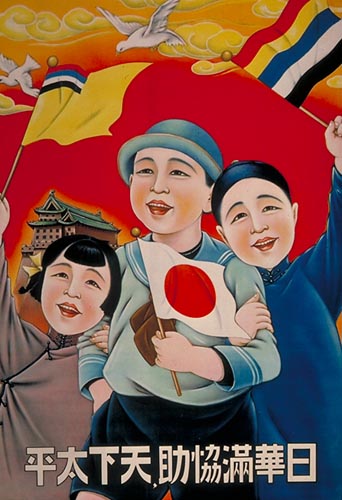The League of Nations began after World War I as a body designed to preclude another disastrous war like the one just concluded. Along with a bunch of platitudes about respecting the rights of minorities and national boundaries, it placed a lot of hypothetical restrictions on military spending - especially navies. Part of this was self-preservation - navies were expensive. Especially when countries like the USA and Japan could afford to spend more than European nations. But not everybody bought into these restrictions, and it was very unequally followed until the system broke down entirely in the 1930s.
Japan had been on the move ever since the Meiji Restoration. Building up a powerful army and navy, the most modern in the region, it sought to put this force to good use. The First Sino-Japanese war in 1895 resulted in significantly increased Japanese presence in the Korean Peninsula. This same war gave control of Taiwan to Japan. In 1904-05, the Japanese Empire fought Russia and drove the Czarist forces from Korea completely, leading to Japan's annexation of the peninsula in 1910. Japan used WWI to sieze German holdings in the South Pacific. This was followed by the invasion of Manchuria in 1931 and the second Sino-Japanese war in 1937, which featured the Rape of Nanking. There is a lot of information about this event on the web. Who controls it? We will discuss this.
Japanese expansionism 1900-1941
So what drove the Japanese to expand in such a fashion? And what was the Greater East Asia Co-Prosperity Sphere?
Why does this image put me in mind of REM's "Shining Happy People?"
The reality wasn't quite so shiny or happy.
Mussolini was the first true practical progenitor of the theory of Fascism. This is his description of the system, which is worth reading. Hitler may have gone farther, but you could argue that Mussolini was the real innovator. Of course the Fascists could produce excellent consumer goods, an act of which you could not accuse the Soviets.
1938 Alfa Romeo Tipo 8C 2900B
But we must consider how Mussolini came to power. Was it just because he supposedly made the "trains run on time?" Perhaps we should consider what was going on in post World War I France with regard to the emergence of Socialist, Communist, and Democratic (and Fascist) wings of the government. What role did violence play in turning the tide?
Even the Russians freely admit that Stalin was a sociopath, and the "Revelations of the Russian Archives" presented by the Library of Congress does much to document that.
Stalin and Colleagues, 1929 (People here are going to die)
From the Library of Congress "Revelations of the Russian Archives"
What was the Cult of the Personality and who was Leon Trotsky? What happened to ol' Leon?
How would you like to be one of these friends? Here is a letter from one of them.
But what a nice guy, right?
But what a nice guy, right?
As this Pravda puff piece from 1930 indicates, the Soviets were not above lying about the success of their collectivization activities.






No comments:
Post a Comment